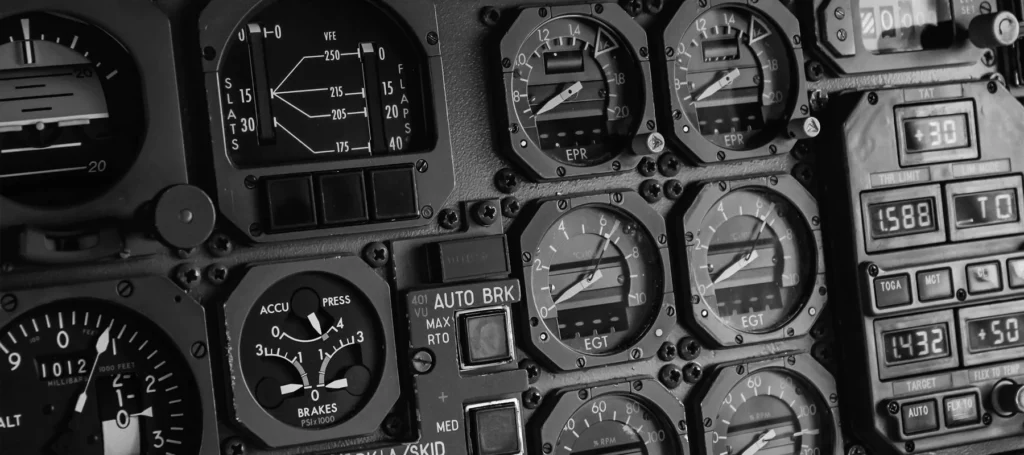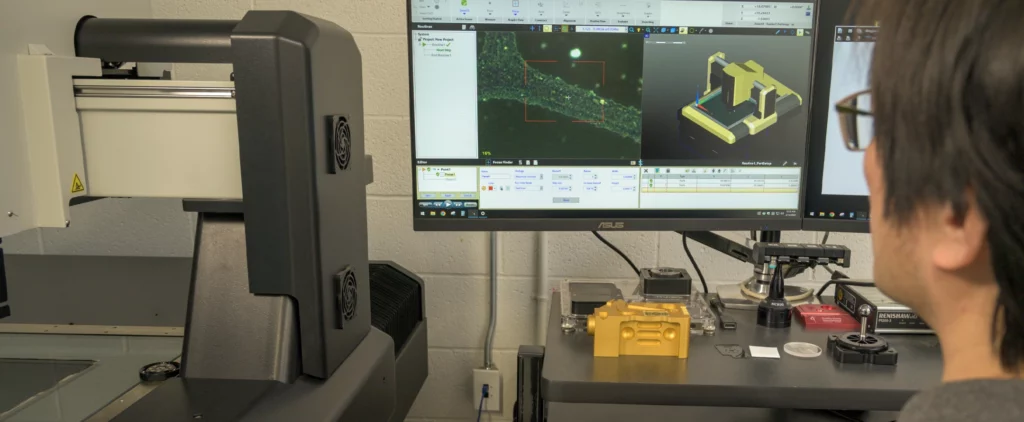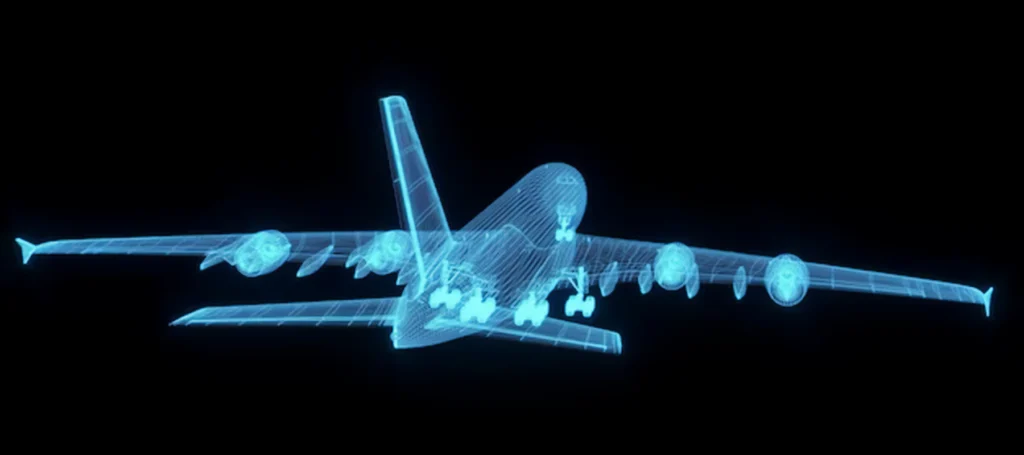In this article, we explore titanium’s powerful properties, its main advantages, key applications within the aerospace industry, and how it’s shaping the future of this critical industry.
Known as The Wonder Metal due to its unique properties, titanium is driving innovation within aerospace, shaping the future of the industry both on the ground and in the air.
Through advanced manufacturing techniques like photochemical etching, strong, reliable, and resistant titanium-etched components have become indispensable in the design and manufacturing of aircraft and spacecraft.
A leading expert in photochemical etching, E-Fab specializes in fabricating titanium components for critical aerospace applications. With two dedicated manufacturing lines for titanium and titanium alloys, we ensure high-quality, precision-engineered components that perform under even the harshest environmental conditions.
In this article, we explore titanium’s powerful properties, its main advantages, key applications within the aerospace industry, and how it shapes the future of this critical industry.

The Wonder Metal: Why Titanium Is So Widely Used in Aerospace
Titanium stands out as the clear choice for aerospace applications for a number of reasons.
Pure titanium boasts a high strength-to-weight ratio that allows for lighter, more fuel-efficient aircraft, while its good corrosion resistance ensures longevity even in harsh environments. Titanium’s ability to withstand extreme temperatures also makes it ideal for components exposed to high thermal stress. These unique properties improve performance and safety and reduce maintenance costs, making titanium a preferred material for critical aerospace components.
What sets titanium apart from other metals?
- High Strength-to-Weight Ratio: Titanium and titanium alloys are renowned for their exceptional strength-to-weight ratio, significantly higher than many other metals. This property is crucial in aerospace, where reducing weight is essential for enhancing fuel efficiency and performance.
- Corrosion Resistance: Titanium is extraordinarily resistant to corrosion, including resistance to sea water, aqua regia, and chlorine. This superior corrosion resistance makes it ideal for aircraft parts that must endure harsh environmental conditions without corroding or degrading.
- High-Temperature Performance: Unlike many other metals, titanium maintains its strength even at high temperatures. Titanium’s high-temperature stability is particularly important for parts exposed to the high temperatures generated by jet engines and frictional heating during flight.
- Low Thermal Expansion: Titanium’s thermal expansion rate is lower than that of steels, aluminum, and many other metals. As a result, parts behave more predictably under varying temperatures, which is critical for maintaining structural integrity and performance.
Biocompatibility: Although more relevant in medical applications, titanium’s biocompatibility is an indicator of its inertness and ability to perform well without reacting with other materials or degrading over time.

Critical Aerospace Applications
Modern aircraft and spacecraft rely on etched titanium components to provide precision and reliability in critical areas. They are commonly used in the production of turbine blades, hydraulic tubing, and engine components, where their strength and heat resistance are crucial. The precision of photochemical etching allows for intricate designs and tight tolerances, enhancing engine efficiency and performance.
One notable example is the use of titanium-etched components in the Boeing 787 Dreamliner. The aircraft utilizes various titanium forms in its engines and airframe, contributing to its lighter weight and improved fuel efficiency. Forged wing structures made from titanium also provide superior strength and durability, essential for the integrity of the aircraft’s wings.
When it comes to space exploration, NASA has employed etched titanium parts in the Mars Rover, ensuring durability and performance in the harsh Martian environment.
Using etched titanium parts in aircraft engines and landing gear – especially military aircraft – significantly reduces weight without compromising strength, leading to better fuel efficiency and reduced emissions.
For more than 40 years, E-Fab has delivered precision metal parts to industry-leading companies within the aerospace industry. We deliver parts for use in highly sensitive applications where failure is not an option, so we ensure that components meet the highest quality and precision standards.
E-FAB offers parts that include, but are not limited to:
- Aerospace sensor elements
- Electric powertrain components
- Fuel cell plates
- Customized aviation parts
- High-precision screens and filters
- Intricate components for aircraft systems
- Precision components for aerospace sensors
- Miniaturized parts for aviation technology
- Aerospace instrumentation components

Advantages of Titanium in Aerospace Applications
Titanium offers a number of key advantages in aerospace applications due to its excellent strength-to-weight ratio, corrosion resistance, and temperature resistance.
Titanium-based alloys are particularly valued for their enhanced mechanical properties and durability. These alloys contribute to lighter, more fuel-efficient aircraft and offer superior performance in critical components such as engine parts and structural elements.
Key advantages include:
- Structural Efficiency: The high strength-to-weight ratio of titanium allows for the design of lighter yet stronger and more efficient structural components. This weight reduction directly translates to better fuel efficiency and higher payload capacities.
- Durability and Longevity: Titanium’s resistance to corrosion and ability to withstand a wide range of environmental conditions reduce maintenance costs and increase the lifespan of aerospace components. This makes titanium a cost-effective choice over the life of the aircraft.
- Heat Resistance: Many aerospace components are subjected to extreme temperatures during operation. Titanium’s ability to retain its strength at high temperatures makes it ideal for critical components in and around engines, as well as in aircraft structural elements that experience high thermal stresses.
- Compatibility with Composite Materials: Titanium is often used in conjunction with advanced composite materials used in aerospace. Its thermal expansion properties are similar to those of many composites, which minimizes stresses at joints between different materials under temperature changes.
Safety and Performance: Its reliability under various operational stresses contributes to the safety, performance, and airworthiness of aerospace vehicles.

Quality and Compliance Excellence
In an industry where failure is not an option, ensuring the quality and safety of aerospace components is paramount. Titanium-etched parts must adhere to stringent standards to perform at that level. Compliance with regulations like RoHS (Restriction of Hazardous Substances) and REACH (Registration, Evaluation, Authorization, and Restriction of Chemicals) promotes environmental responsibility and safety.
RoHS compliance ensures that the materials used are free from hazardous substances, reducing the environmental impact and enhancing worker safety. REACH compliance involves a thorough assessment of chemical risks, ensuring that all substances used in manufacturing are safe for humans and the environment. These standards are vital in maintaining the integrity and sustainability of aerospace manufacturing processes, ensuring that titanium-etched components are both high-quality and eco-friendly.
E-FAB is ISO9001:2015 certified, ensuring that all components adhere to stringent quality control and compliance standards. We’re experts at working with aerospace-grade alloys and are renowned for producing highly accurate and precise components that can be relied on in critical aerospace applications.

The Future of Titanium in Aerospace
As aerospace technology continues to advance, the role of titanium is set to expand further. The titanium industry continues to innovate, producing advanced materials that meet the stringent demands of modern aerospace engineering, ultimately improving the safety, efficiency, and longevity of aircraft and spacecraft. Titanium etching will play a critical role in these developments, enabling the creation of more complex and efficient components.
Potential new uses for titanium and titanium alloys in aerospace include its application in next-generation propulsion systems and advanced thermal protection for hypersonic vehicles. The integration of titanium with carbon fiber-reinforced polymers could lead to even lighter and stronger airframes. As the industry pushes towards more sustainable and efficient solutions, titanium’s versatility and strength will be indispensable in achieving these goals.
E-FAB plays a pivotal role in advancing aviation technology by delivering a wide range of precision metal components designed specifically for aerospace applications.

Shaping the aerospace industry on the ground and in the air
Titanium products, particularly etched components, are at the forefront of aerospace innovation, enhancing aircraft and spacecraft performance, safety, and efficiency. The unique properties of titanium, combined with the precision of etching techniques, are driving advancements in aerospace technology. And with reliance on this wonder metal only set to grow, titanium is poised to continue shaping the future of the aerospace industry both on the ground and in the air.
As specialists in precision components for a wide range of aerospace applications and leaders in aerospace industry titanium, the team at E-FAB can deliver the highest level of quality and reliability for your aerospace project.
We can design and produce precision components that meet strict tolerances and quality standards, ensuring the structural integrity and reliability of the final products.
If you need precision titanium components for your aerospace project, contact us today or request a quote.

